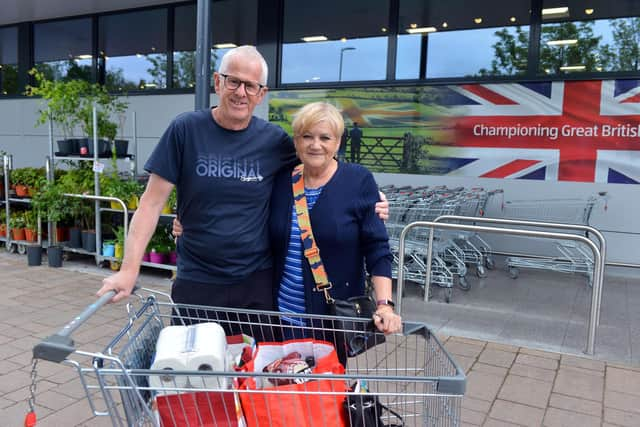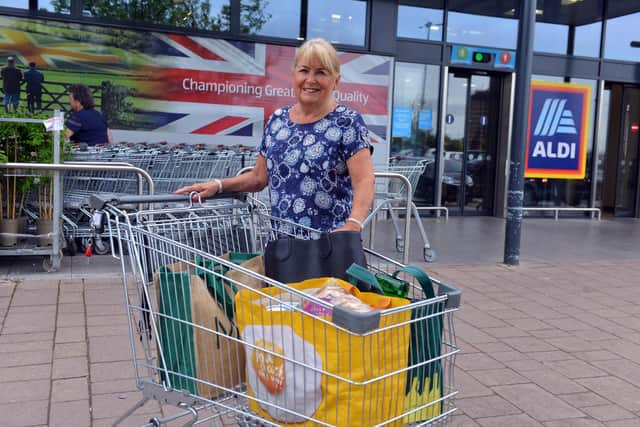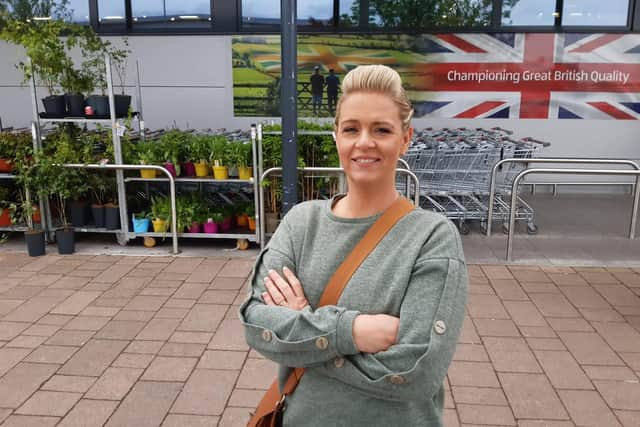Watch as Sunderland food banks and shoppers give their views on cost of living crisis
and live on Freeview channel 276
Clive was reacting after the Governor of the Bank of England, Andrew Bailey, this week warned of a "very big income shock" from the increase in global food prices which he described as being potentially “apocalyptic” in scale.
Inflation hit seven per cent in March and is predicted to hit 10 per cent by the autumn. Rising costs of fuel and instability in global food supplies as a result of the war in Ukraine – the worlds biggest exporter of sunflower oil and a major producer of cereals – has created a recipe which has led to a sizeable increase in prices being paid at supermarket tills.
Advertisement
Hide AdAdvertisement
Hide AdCompounded by spiralling fuel and energy bills it’s a situation which has led to record-breaking numbers of people turning to food banks.
Clive said: “We’ve seen a massive increase demand and we are seeing a large number of people coming into the Galleries food bank that we’ve never seen before.
"In the last year we’ve seen over a 30 percent increase in the food parcels being given out and at the moment we are seeing a month on month average increase of about 15 per cent.”
It’s a situation which has seen donations struggling to meet demand.
Advertisement
Hide AdAdvertisement
Hide AdClive added: “We get donations during the autumn and at Christmas which normally keeps our standard stock items going throughout the year. However, we’ve just had to buy in a big food order to meet demand.


"We are the sixth richest country in the world and people shouldn’t have to be dependent on food banks. The Government should never have gone ahead with the National Insurance increase or the removal of the Universal Credit uplift payment.”
Sunderland Community Soup Kitchen, who provide free takeaway meals, have also seen a large increase in people needing help.
Founder Andrea Bell said: “We recently had our largest number of visitors, with 165 people needing to be fed. Over the last two years the number of people needing help is the largest I’ve seen it and many people just can’t afford to eat.


Advertisement
Hide AdAdvertisement
Hide Ad"We are also seeing an increase in people needing help who are in employment but aren’t earning enough money to pay all the bills.”
Increased energy costs have also seen a change in some of the food Andrea provides.
She said: “I absolutely hate pot noodles as I don’t think they offer much as a food, but regretfully I’ve had to order some as people are saying ‘give me something I just need to boil water for’ as they’re also struggling with energy bills.
"I have a fridge full of frozen meals but many people can’t afford to put the oven on. More also needs to be done to educate people about budgeting and how to cook on a budget.


Advertisement
Hide AdAdvertisement
Hide Ad"There’s lots of support for people here in Sunderland but there’s also increasing demand.”
With many low income families hardest hit, Anna Turley, Chair of the North East Child Poverty Commission added: “This is a deeply worrying time for thousands of families in Sunderland, and the clear message from the organisations we work with is that the soaring cost of daily essentials like food is causing serious hardship for rapidly growing numbers of people across the North East - many of whom are in work.
‘Families are facing absolutely impossible decisions about what more they can cut back on, and overstretched local organisations such as food banks are being left to pick up the pieces of the Government’s totally inadequate response.”
Sunderland residents feeling the strain of increased food prices as cost of living starts to bite
While many residents shopping in the Galleries hadn’t turned to support from food banks, they were having to make decisions about where they shopped and the items they bought as well as other lifestyle choices to meet the increased cost of living.
Advertisement
Hide AdAdvertisement
Hide AdLaura Tomlinson, 40, who was shopping for a family of four, said: “Everything has gone up by what seems like about 20 per cent. Items which were a pound now seem to be at least £1.20 which when multiplied across a whole shop is a lot of money.


"I’ve started shopping around a lot more and we’ve stopped buying treats.”
While fortunate to be in a position to absorb the additional costs, Laura stressed that some of her relatives were not so lucky.
She added: “My dad lives on his own and he’s not eating properly because of the expense of food. My niece is also struggling with the increase in energy costs and so she only puts the heating on when the kids come home.
Advertisement
Hide AdAdvertisement
Hide Ad"It’s the poor who are always penalised the most and there must be money in Government to help these people.”
Terry Sergeant, 56, added: “I’ve not changed my shopping habits but it has had an impact on my mam who now only has one pension after my dad died. She’s always been independent, but she’s now having to b be careful for the first time in her life about the things she buys.”
John Adams, 76, also said he now “shopped around to get the best prices” while Christine Brown, 74, said her food bills had “increased by around 20 per cent”.
Rising costs have also resulted in retired couple Bill and Elaine Obee having to curtail their retirement plans.
Advertisement
Hide AdAdvertisement
Hide AdElaine, 70, said: “We shop around more and tend to buy supermarket brands but our food bills have still gone up by at least 10 per cent. The biggest increase has been in our energy bill which has gone from £99 to £170 a month.
"We used to go on three holidays a year but we’ve restricted it to just one.”
The situation has also led to Civil Service worker and mum of two Claire Ingleby having to make some serious lifestyle choices.
Claire, 35, said: “I don’t shop as often and we’ve stopped buying certain items but our food bills have still gone up £62 a month. We’d love to go on a family holiday – I’ve forgotten what one is – but we can’t with the cost of everything.
Advertisement
Hide AdAdvertisement
Hide Ad"My grandmother is 83 and she said this is the worst she’s ever known it. The Government definitely need to be doing more to help with the cost of food, fuel and energy.
"They also need to provide more support with childcare costs. I’m due to finish maternity and I’m not sure it’s financially viable for me to go back and pay childcare costs.”
Responding to the situation a Government spokesperson said: “We understand that people are struggling with rising prices, and while we can’t shield everyone from the global challenges we face, we're supporting British families to navigate the months ahead with a £22 billion package of support.
“That includes saving the typical employee over £330 a year through a tax cut in July, allowing people on the Universal Credit taper rate to help people keep more of the money they earn – benefiting over a million families by around £1000 a year, and providing millions of households with up to £350 each to help with rising energy bills”
Comment Guidelines
National World encourages reader discussion on our stories. User feedback, insights and back-and-forth exchanges add a rich layer of context to reporting. Please review our Community Guidelines before commenting.
